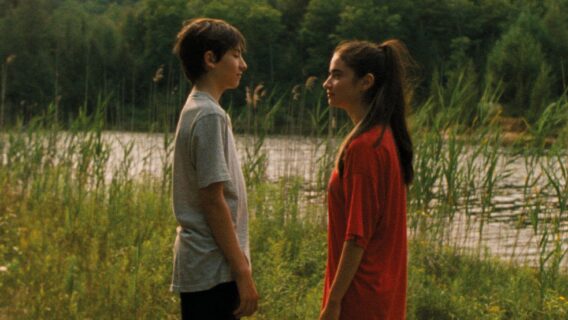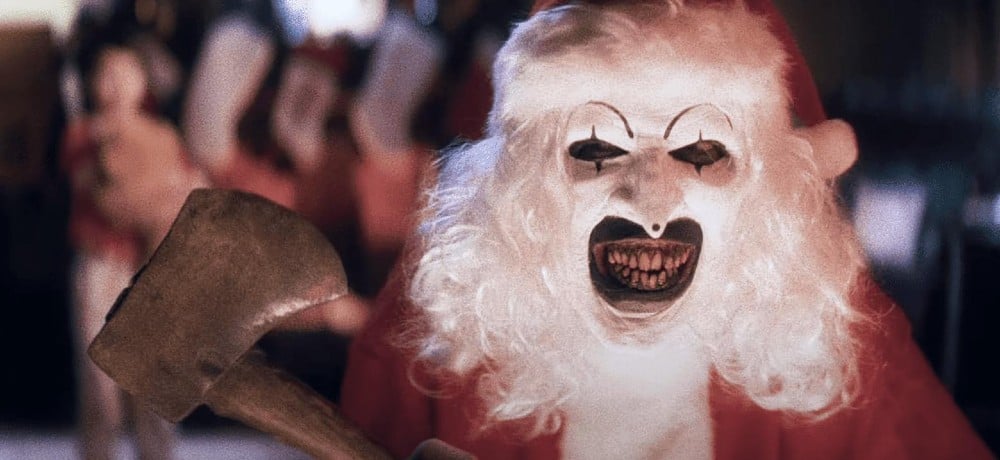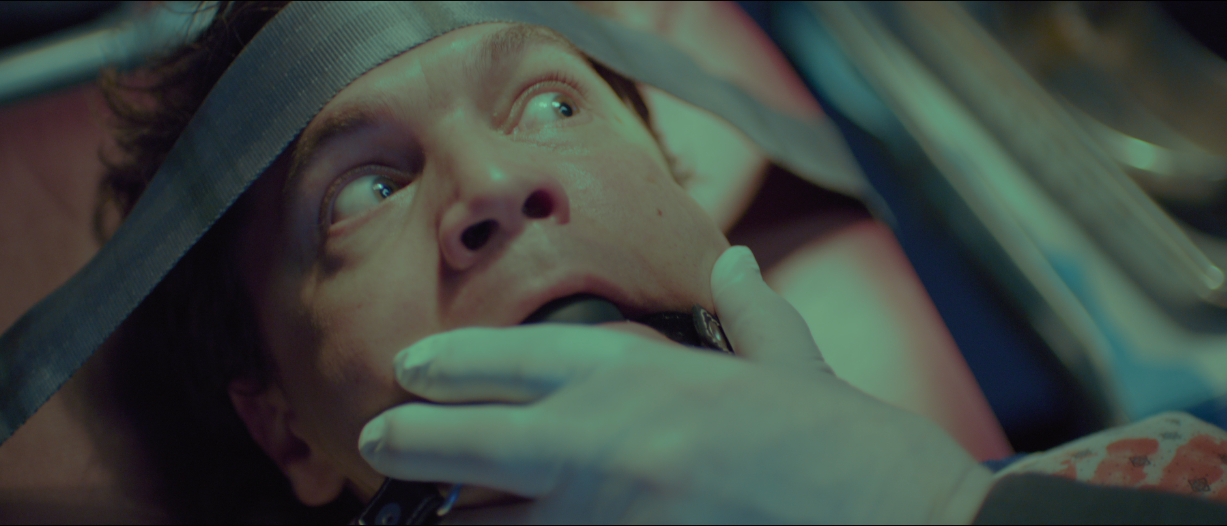
The lazy days of summer are the best and worst times of a kid’s young life. They’re when you can explore the world with newfound freedom, ride bikes through the neighborhood, meet new friends at the pool or on vacation, and maybe even fall in love. The pounding sun creates a haze around everything, making summer as a kid feel like a dream, an unmoored time that can be life-changing, for better or worse. Director Charlotte Le Bon captures all of that and more in her feature film debut Falcon Lake.
The film begins with 13-year-old Bastien (Joseph Engel) heading to the beautiful Quebec countryside to stay at a family friend’s idyllic lakeside cabin. Joined by his parents and younger brother, Bastien expects another lazy summer full of aimless wandering, quiet bike rides through the forest, and exploring the lake. But, when he arrives, he meets their 16-year-old daughter Chloe (Sara Monpetit). He’s immediately fascinated with her, from her long, dark hair to her obsession with an urban legend about a kid who drowned in the lake.
Also Read: ‘Giving Birth to a Butterfly’ Review: A Tiny Triumph of Desperation and Rebirth
As the days slowly pass, Bastien and Chloe spend more and more time together. Bastien drinks his first beers at a party for older kids and impresses Chloe’s friends with his dance moves. He covers himself with a sheet to pose as a ghost for Chloe. And with each passing day, he falls more and more in love with her, even as she talks about her ex-boyfriend. But as summer quickly approaches its end, something looms over their halcyon days. Something terrible awaits these kids, ready to decimate their youth.
But even before the final act reveal, Le Bon, with the help of her cinematographer Kristof Brandl, drenches Falcon Lake is an overwhelming sense of dread. Sure, a lot of the film takes place in broad daylight, with the lake shining in the background and the green hues of nature softly framing Bastien and Chloe. But there are moments when the camera lingers on an empty frame for just a second too long, or moments where shadows seem like they’re swallowing up our characters. These moments, while quiet, make Falcon Lake a wholly disquieting and uneasy experience.
Le Bon also never shies away from the realities of desire and treats her young characters as fully realized humans rather than two-dimensional figures that only exist on paper. Her camera mimics the wandering eye of a teenage boy, who is likely to grab a quick look at a girl’s chest. But, Le Bon also shows us how Bastien looks at Chloe’s back, hair, eyes, everything. This isn’t about sexualizing a young girl, but about depicting the growing desire of a young boy.
Also Read: ‘The Blackening’ Is The Horror Comedy Of The Summer [Review]
Yes, there are readings that can be made to say that Chloe is just an object for Bastien’s growth. But this is Bastien’s world and we see it solely from his point of view. We must live with how he sees and interprets everything, no matter how frustrating. And it definitely is, because he’s a teenage boy and makes quite a few mistakes as he begins to navigate romance. In occupying his perspective, Le Bon makes the ending of Falcon Lake all the more heartbreaking.
Adding to the uneasiness and dread of the film is the stellar score from Shida Shahabi. She uses pulsating, electronic tones that are dissonant with the grainy and colorful images onscreen, which again creates a sense of uneasiness. The music feels distinctly like it’s from a horror movie, and yet Falcon Lake doesn’t really look like a horror movie. Shahabi’s score is one of the first pieces of evidence that something isn’t right here. It is a persistent haunting clue that haunts the film until its very last frame.
Also Read: ‘Jagged Mind’ Personifies the Horrors of Toxic Relationships [Review]
Uniting all of these elements is Le Bon’s direction, particularly when it comes to her young stars. While Falcon Lake is definitely a slow burn, Le Bon keeps viewers engaged with a fascinating and layered relationship between a young boy and a teenage girl. Engel and Monpetit have astounding chemistry and are able to grab our attention immediately as they start the intricate dance they choreograph around one another. Between their acting and Le Bon’s direction, they beautifully capture and portray the horrors of heartache.
Most of Falcon Lake follows the usual coming-of-age story beats. But what makes this film stand out among the pack is Le Bon’s direction, cinematographer Brandl’s use of shadow, and Shahabi’s electrifying score. These elements come together to create an anti-coming-of-age story, one that eschews hope for an exciting life for a more harrowing reality. Le Bon isn’t trying to make another Call Me By Your Name where heartbreak is crucial to growing up. Instead, she creates something wholly unique that also feels familiar, an uncanny experience that makes the hazy days of summer feel dangerous.
Summary
With Falcon Lake, director Charlotte Le Bon creates something wholly unique that also feels familiar, an uncanny experience that makes the hazy days of summer feel dangerous.
Categorized: Reviews



















![‘Bloodrise: Subspecies V’ Proves That Full Moon Still Shines [Review] ‘Bloodrise: Subspecies V’ Proves That Full Moon Still Shines [Review]](https://wickedhorror.com/wp-content/uploads/2023/05/subspecies-5-1-1024x542.jpg)

:quality(85):upscale()/2023/08/13/793/n/1922564/93b9ff5c64d91a976e7f87.53076199_.jpg)






